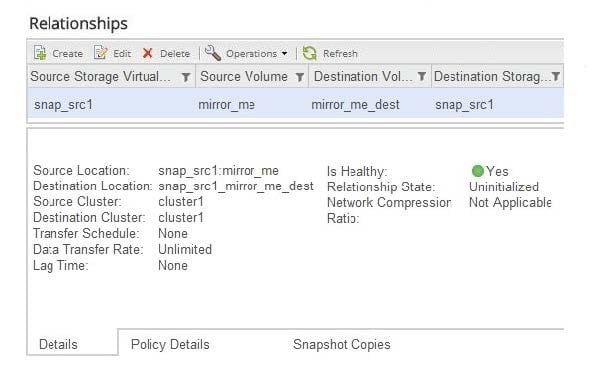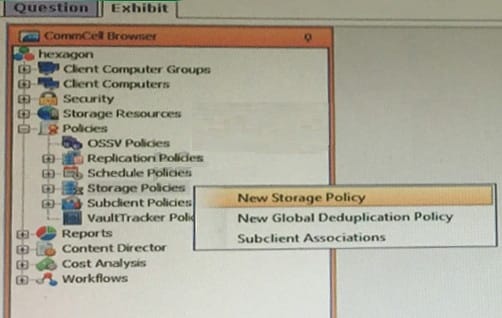NS0-527 Online Practice Questions and Answers
You are planning to deploy MetroCluster IP. As part of the implementation strategy, you are asked to verify that youhave the relevant hardware for the deployment. Which two elements are required to deploy your solution? (Choose two.)
A. storage controllers
B. FC network switches
C. cluster peering network
D. iSCSI Ethernet switches
An ONTAP administrator is trying to configure a three-way-disaster recovery solution. Cluster 2 is within 50 km of Cluster 1, the primarycluster, with an RTT of 7 ms. Cluster 3 is over 300 km from Cluster 1 with an RTT of 29 ms. In this scenario, what are two topologies that would accomplish this task? (Choose two.)
A. a cascade topology from Cluster 1 to Cluster 2 with SnapMirror Synchronous, and then SnapMirror asynchronous from Cluster 2 to Cluster 3
B. a fan out topology with SnapMirror Synchronous from Cluster 1 to Cluster 2 and SnapMirror Synchronous to Cluster 3
C. a fan out topology with SnapMirror Synchronous from Cluster 1 to Cluster 2 and SnapMirror asynchronous from Cluster 1 to Cluster 3
D. a cascade topology from Cluster 1 to Cluster 2 with SnapMirror Synchronous, and then SnapMirror Synchronous from Cluster 2 to Cluster 3
You noticed that your SnapVault relationship is healthy but that the destination volume does not have any Snapshot copies. In this scenario, what should be performed to solve the problem?
A. Set up volume destination free space.
B. Set up volume source free space.
C. Use the snapvault update command.
D. Configure a rule with the Snapshot label.
A client has two regional offices that use SnapMirror cross-site replication to host disaster- recovery mirrors for both offices. Aco-worker at one office is requesting read/write access to one of the volume mirrors. You must accomplish this task without interrupting data access or replication.
In this scenario. how should you proceed?
A. Create a FlexVol volume on the destination cluster so that it is writeable for the co- worker.
B. Create a FlexClone volume based on one of the Snapshot copies at the destination so that it is writeable for the co-worker.
C. Break the SnapMirror relationship between the local and remote clusters, andmake the destination volume writeable for the co-worker.
D. Modify the export policy on the destination mirror volume so that it is now writeable for the co-worker.
Click the Exhibit button.

Your customer wants to protect a volume and replicate it to a secondary volume. The customer has tried to configure this relationship using OnCommand System Manager. Upon reviewing this newly configured relationship, you discover that the configuration does not satisfy the customer's stated requirements.
Referring to the exhibit, what should you do to ensure that the volume is protected?
A. Deletethe relationship and recreate it.
B. Resynchronize the relationship.
C. Initialize the relationship.
D. Change the schedule to hourly.
You are asked to protect your customer's Exchange environment. You deploy SnapCenter 4.1 and the plug-in for Microsoft Exchange Server. While creating the backup policy, you select the Full and Log Backup from the list of supported backup types.
In this scenario, what would the Full and Log Backup type allow you to protect within Exchange?
A. all databases but no transaction logs
B. all databases and all transaction logs
C. all uncommitted transaction logs and all of the databases
D. all transaction logs but none of thedatabases
Which two types of volumes support NDMP backup? (Choose two.)
A. FlexCache
B. Flash Pool
C. FlexVol
D. FlexGroup
An administrator wants to use SnapCenter 4.2to back up and restore both their VMware Horizon environment and Microsoft SQL attached database.
In this scenario, which service account role should be configured to accomplish this task?
A. sysadmin
B. operator
C. backup
D. administrator
Click the Exhibit button.

You have a SnapProtect v11 environment as shown in the exhibit. What are the two default Snapshot copies created automatically after creating a Storage Policy. (Choose two.)
A. Primary (Tape)
B. Primary (Classic)
C. Primary (NetApp)
D. primary (Snap)
Your customer wants to implement a solution to protect only a select number of NFSv3 volumes in aparticular aggregate that stores their mission-critical application data. The customer wants the volume's data replicated to secondary storage and have application write operations fail if they cannot be replicated. The customer needs to maintain a zero RPO and a very low RTO.
In this scenario, which solution satisfies these requirements?
A. SnapMirror Synchronous using Sync mode
B. Mirrored aggregates using SyncMirror
C. SnapMirror Synchronous using StrictSync mode
D. Mirrored SVMs using MetroCluster